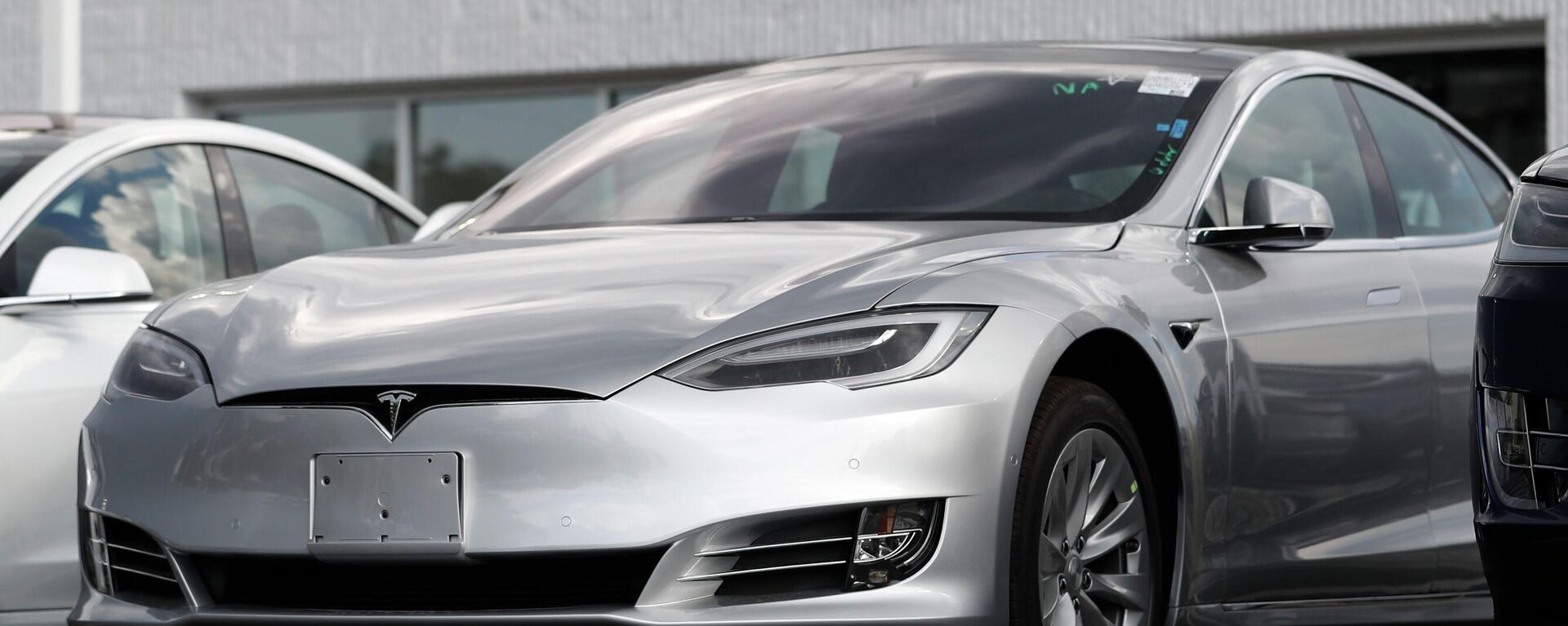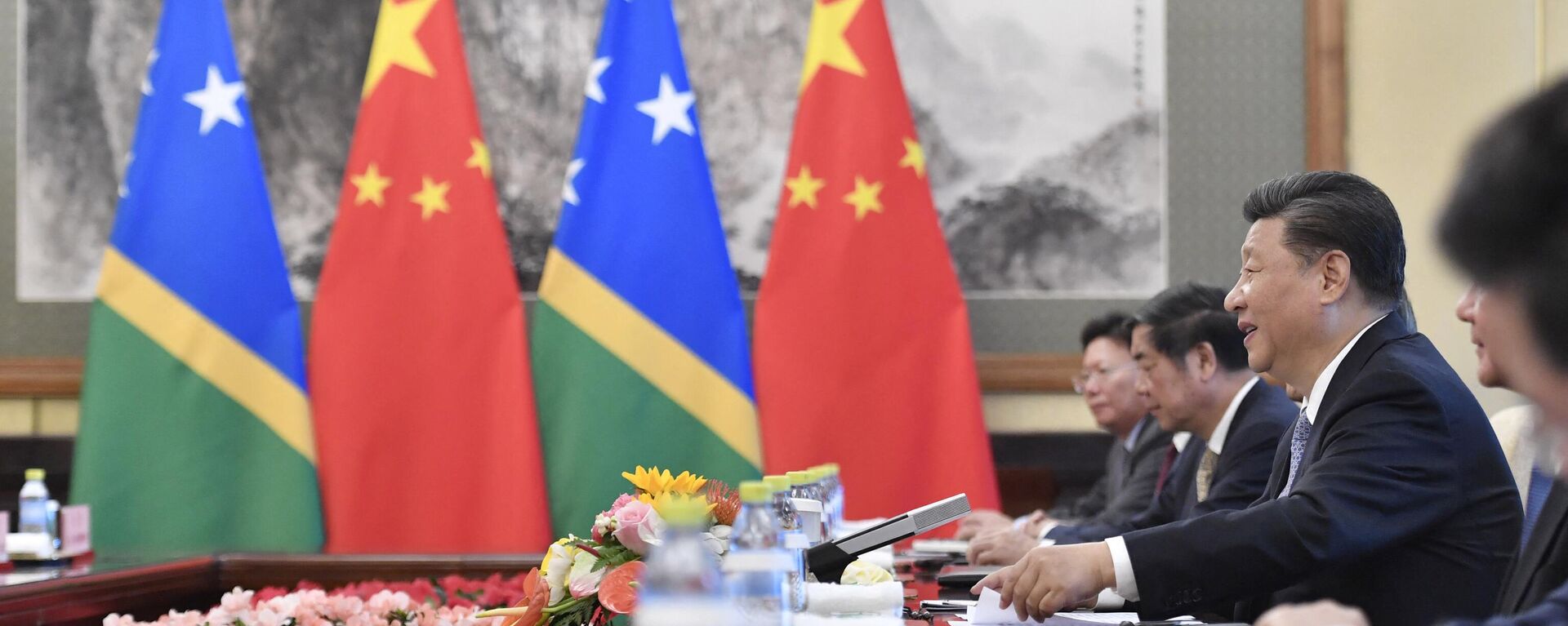https://sputnikglobe.com/20220523/china-far-outspending-others-to-aid-favored-industries-study-finds-ahead-of-bidens-ipef-rollout-1095706955.html
China Far Outspending Others to Aid Favored Industries, Study Finds Ahead of Biden’s IPEF Rollout
China Far Outspending Others to Aid Favored Industries, Study Finds Ahead of Biden’s IPEF Rollout
Sputnik International
The Biden administration has been working for months to investigate Chinese subsidies and formulate a strategic initiative that seeks to strengthen the US’... 23.05.2022, Sputnik International
2022-05-23T01:30+0000
2022-05-23T01:30+0000
2022-05-23T01:31+0000
china
us
federal subsidies
center of strategic and international studies (csis)
csis
beijing
washington
south korea
biden administration
indo-pacific
https://cdn1.img.sputnikglobe.com/img/07e6/05/17/1095706556_0:0:1174:660_1920x0_80_0_0_63322732872d2eab930a452625555ba2.png
A new study set to be published Monday by Center for Strategic and International Studies determined that China’s spending on favored industries with state-directed funds, low- to no-interest loans, and other government-led incentives was higher than any other major economy studied.The Washington-based think tank’s analysis, first revealed Sunday in the Wall Street Journal, found that Beijing’s spending on its companies amounted to at least 1.73% of China’s gross domestic product (GDP) in 2019, the most recent year with comprehensive value.Over the years, China’s industrial initiatives have shifted from the goal of technologically “catching up” to the West, to honing in on specific industries driving modern-day innovation, such as artificial intelligence and electric vehicles, the study notes.Analysts value China’s spending on industrial subsidies to amount to more than $240 billion when based on market exchange rates, and $407 billion when based on internationally adjusted exchange rates. This exceeds the nation’s reported military spending.The nation’s spending–whether measured by GDP or in dollar terms–is higher than that of the other seven major economies analyzed in the report, including Brazil, France, Germany, Japan, South Korea, Taiwan, and the United States.Per the report, South Korea ranked second, spending 0.67% share of its 2019 GDP on industrial support, while the US spent 0.39% of its GDP during the same period.Kennedy and the other two authors, Gerard DiPippo and Ilaria Mazzocco, told the outlet that the study is intended to be a catalyst for more substantive discussion among policymakers, business leaders, and academics, regarding the worldwide impact of China’s industrial spending.It also appears the CSIS report is coming in lockstep with the Biden administration’s plans to expand US economic engagement in the Indo-Pacific and further attempt to counter Beijing’s influence in the region via a new economic framework targeting East Asia and Southeast Asia.China Says IPEF Opposes Free Trade, is Destined to FailThe Indo-Pacific Economic Framework for Prosperity (IPEF), set to be unveiled by US President Joe Biden in Japan on Monday, seeks to renew the US Indo-Pacific economic engagement through the establishment of common standards in areas such as clean energy, infrastructure, digital trade, and supply-chain resilience.The IPEF has endured vocal opposition from Beijing, which views the plan as an avenue to clique up and divide countries in the Indo-Pacific, rather than allow them to work together to create a shared future.On Sunday, Chinese Foreign Minister Wang Yi declared that while China is receptive to initiatives seeking to strengthen regional cooperation, it also opposes attempts to create confrontation and division.The framework will come as the US’ first economic arm of Indo-Pacific engagement since then-US President Donald Trump withdrew the US signature from the TPP.Wang went on to assert that the US’ 2017 withdrawal from the TPP, when coupled with the new agreement, proves that Washington is not pursuing free trade.The Chinese foreign minister also warned that the US’ undermining of existing regional cooperation architecture could further complicate supply chains and lead to industrial disruptions that could further hinder economic recovery from the pandemic.Biden’s fanfare surrounding the framework rollout was notably criticized by CSIS trade expert Matthew Goodman, who told Reuters that the US needs to realize that they have to come to the table with more “tangible benefits” for those in the region.A Japanese Finance Ministry official told the outlet that while some Association of Southeast Asian Nations (ASEAN) countries may attend the launch ceremony, others were reluctant to the idea due to the lack of practical incentives, such as tariff reductions or the creation of jobs–which Biden has reportedly opposed to maintain roles in the US.
https://sputnikglobe.com/20220516/tesla-recalls-over-107000-cars-in-china-due-to-cooling-system-defects-1095543182.html
https://sputnikglobe.com/20220419/china-announces-signing-of-security-pact-with-solomon-islands-amid-bidens-attempt-to-sabotage-deal-1094883887.html
china
beijing
washington
south korea
indo-pacific
Sputnik International
feedback@sputniknews.com
+74956456601
MIA „Rosiya Segodnya“
2022
News
en_EN
Sputnik International
feedback@sputniknews.com
+74956456601
MIA „Rosiya Segodnya“
Sputnik International
feedback@sputniknews.com
+74956456601
MIA „Rosiya Segodnya“
china, us, federal subsidies, center of strategic and international studies (csis), csis, beijing, washington, south korea, biden administration, indo-pacific
china, us, federal subsidies, center of strategic and international studies (csis), csis, beijing, washington, south korea, biden administration, indo-pacific
China Far Outspending Others to Aid Favored Industries, Study Finds Ahead of Biden’s IPEF Rollout
01:30 GMT 23.05.2022 (Updated: 01:31 GMT 23.05.2022) The Biden administration has been working for months to investigate Chinese subsidies and formulate a strategic initiative that seeks to strengthen the US’ technological edge and recommit the country’s economic engagement in the Indo-Pacific after withdrawing from the Trans-Pacific Partnership (TPP) back in 2017.
A new study set to be published Monday by Center for Strategic and International Studies determined that China’s spending on favored industries with state-directed funds, low- to no-interest loans, and other government-led incentives was higher than any other major economy studied.
The Washington-based think tank’s analysis,
first revealed Sunday in the Wall Street Journal, found that Beijing’s spending on its companies amounted to at least
1.73% of China’s gross domestic product (GDP) in 2019, the most recent year with comprehensive value.
Over the years, China’s industrial initiatives have shifted from the goal of technologically “catching up” to the West, to honing in on specific industries driving modern-day innovation, such as artificial intelligence and electric vehicles, the study notes.
Analysts value China’s spending on industrial subsidies to amount to more than $240 billion when based on market exchange rates, and $407 billion when based on internationally adjusted exchange rates. This exceeds the nation’s reported military spending.
The nation’s spending–whether measured by GDP or in dollar terms–is higher than that of the other seven major economies analyzed in the report, including Brazil, France, Germany, Japan, South Korea, Taiwan, and the United States.
Per the report, South Korea ranked second, spending 0.67% share of its 2019 GDP on industrial support, while the US spent 0.39% of its GDP during the same period.
“China is a large outlier,” said report author Scott Kennedy, an expert on China's economy at CSIS. “It spends an enormous amount on industrial policy and also uses more tools for such spending than anybody else.”
Kennedy and the other two authors, Gerard DiPippo and Ilaria Mazzocco, told the outlet that the study is intended to be a catalyst for more substantive discussion among policymakers, business leaders, and academics, regarding the worldwide impact of China’s industrial spending.
It also appears the CSIS report is coming in lockstep with the Biden administration’s plans to expand US economic engagement in the Indo-Pacific and further attempt to counter Beijing’s influence in the region via a new economic framework targeting East Asia and Southeast Asia.
China Says IPEF Opposes Free Trade, is Destined to Fail
The Indo-Pacific Economic Framework for Prosperity (IPEF), set to be unveiled by US President Joe Biden in Japan on Monday, seeks to renew the US Indo-Pacific economic engagement through the establishment of common standards in areas such as clean energy, infrastructure, digital trade, and supply-chain resilience.
The IPEF has endured vocal opposition from Beijing, which views the plan as an avenue to clique up and divide countries in the Indo-Pacific, rather than allow them to work together to create a shared future.
On Sunday, Chinese Foreign Minister Wang Yi declared that while China is receptive to initiatives seeking to strengthen regional cooperation, it also opposes attempts to create confrontation and division.
The framework will come as the US’ first economic arm of Indo-Pacific engagement since then-US President Donald Trump withdrew the US signature from the TPP.
Wang went on to assert that the US’ 2017 withdrawal from the TPP, when coupled with the new agreement, proves that Washington is not pursuing free trade.
“The US 'Indo-Pacific Strategy' is causing more and more vigilance and concern in the international community, especially in the Asia-Pacific region,” Wang said in a statement.
The Chinese foreign minister also warned that the US’ undermining of existing regional cooperation architecture could further complicate supply chains and lead to industrial disruptions that could further hinder economic recovery from the pandemic.
Biden’s fanfare surrounding the framework rollout was notably criticized by CSIS trade expert Matthew Goodman, who told Reuters that the US needs to realize that they have to come to the table with more “tangible benefits” for those in the region.
“It seems the White House has decided to make the IPEF launch more like a party with an open bar that all are invited to, with the real work to start on Monday morning,” the trade expert said.
A Japanese Finance Ministry official told the outlet that while some Association of Southeast Asian Nations (ASEAN) countries may attend the launch ceremony, others were reluctant to the idea due to the lack of practical incentives, such as tariff reductions or the creation of jobs–which Biden has reportedly opposed to maintain roles in the US.





